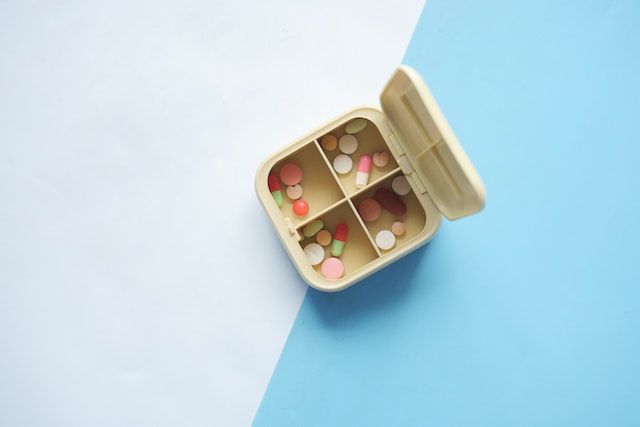Self-Medication of OTC Drugs: Is It Safe?
Over-the-counter (OTC) medicines are drugs you can buy without a doctor’s prescription.
They’re available almost anywhere but typically at pharmacies/drug stores, convenience stores, grocery stores, department stores, supermarkets, malls, or gas stations.
They don’t require a prescription because they only treat conditions that are easy to self-diagnose.
These include itches, allergies, aches, pains, fever, wounds, or minor injuries.
They’re also used to achieve personal goals, such as increased energy or weight loss.
OTC drugs aren’t as potent as prescription (Rx) drugs and are less likely to be misused or abused—but they can still happen.
To know more about the safety of its consumption, continue to read on.

What Will We Learn?
OTC Drugs Are Generally Safe But With Risks
OTC medications aren’t immediately sold at stores.
They were scientifically and extensively examined and then monitored by the Food and Drug Administration (FDA) in the United States and other countries.
They do so to ensure the effectiveness and safety of their consumption before putting them on the market. In other words, only the safest OTC drugs can be sold and bought from the stores.
However, safety remains a concern when reclassifying prescription drugs as OTC medications.
Such risks include:
- Negative drug interaction – It’s the reaction between two (or more) medicines (called drug-drug interaction) or between a drug and a food/beverage (called drug-food interaction). For example, ACE inhibitors used to control blood pressure can increase potassium levels, so taking them with potassium supplements can lead to high potassium levels that can cause the heart to beat irregularly or, worse, a heart attack.
- Contraindication – It’s a situation when a course of treatment is inadvisable because it’s harmful. For example, decongestantsare contraindicated for hypertensive people. These drugs relieve blocked or stuffy noses by constricting blood vessels, which can increase blood pressure.
- Allergic reactions – It’s the immune system’s reaction to a medicine. It’s not similar to a drug side effect (a known possible reaction to a drug that’s always listed on the drug labels) and drug toxicity (usually caused by drug overuse). Most drug allergies are typically minor hives, rashes, or fevers. However, they may cause anaphylaxis, a severe, rapidly evolving, and multi-system allergic reaction. If left untreated, it can be life-threatening.
- Pregnancy risks – Note that whatever a pregnant woman consumes crosses the baby’s system. When the mommy consumes OTC drugs, the baby may not handle them the same way the mommy does, leading to complications like breathing difficulties and prenatal development issues. For example, taking NSAIDs to relieve Braxton Hicks (pain-like contractions) and other pain felt during the third trimester may cause heart defects and other congenital malformations in the baby.
- Dosage error – It’s the wrong way of administering drugs in incorrect amounts and frequency. This is particularly tricky and problematic when dealing with children’s conditions. Too little medicine can be ineffective, leaving the kids’ initial condition untreated. Too much of it could be harmful to them, causing severe side like depressed breathing (slow and ineffective breathing) and other serious medical concerns.
Nonetheless, many people benefit from these OTC medicines, so some risks are tolerated.
What’s an “acceptable degree of risk” depends on the person’s medical condition.
It varies from person to person, so it’s essentially a judgment call.
Safe Self-Medication with OTC drugs
Self-medication, also called self-administered drugs, is using drugs, either prescribed or bought OTC, to treat and improve any physical condition or emotional state without seeing any professional medical advice.
One of the main safety concerns of self-medicating OTC medicines is people’s inappropriate and incorrect self-diagnosis, not the drugs themselves.
It takes common sense and responsibility to overcome this challenge.
Always do your due diligence and make informed decisions.
Any information about OTC medicines is readily available and easily accessible online.
To give you an example, check the BuzzRx blog. The page doesn’t only contain general dos and don’ts on self-medication of OTC drugs but also topics related to medicines, health, fitness, and many more.
Additionally, always do the following:
- Read the labels carefully and know the correct dosage as well as precautions.
- Consume the medicine exactly as instructed.
- Inform your primary care provider about the consumption of it as soon as possible.
- Be careful when taking several OTC drugs at the same time. Remember the dangers of a negative drug interaction. If unsure, ask the pharmacist or consult a doctor if unsure.
- Use the dosing device in the packaging when feeding liquid medicines to kids. Alternatively, use a medicine dropper or syringe, but don’t use kitchen spoons as they vary in size and may cause dosage errors.
Dangers Of Self-Medication
While it’s often done as a first-aid treatment or preventive measure, improper self-medicating can be very dangerous, especially when done for a long time. Research has shown that it may result in the following dangers:
- Incorrect self-diagnosis
- Masking a medical condition
- Delays in seeking appropriate medical advice
- Rare but severe adverse effects (such as immune system weakness and kidney failure)
- Drug interactions
- Substance misuse
- Substance dependency
- Pathogen resistance
- Increased morbidity
Final Thoughts
OTC drugs are safe and beneficial. However, improper self-medicating of them can be dangerous. It’s important to seek professional medical advice, at least from a pharmacist or virtual doctor, to avoid the dangers of self-medication.
See also: How Are Viruses Different From Bacteria Apex?
